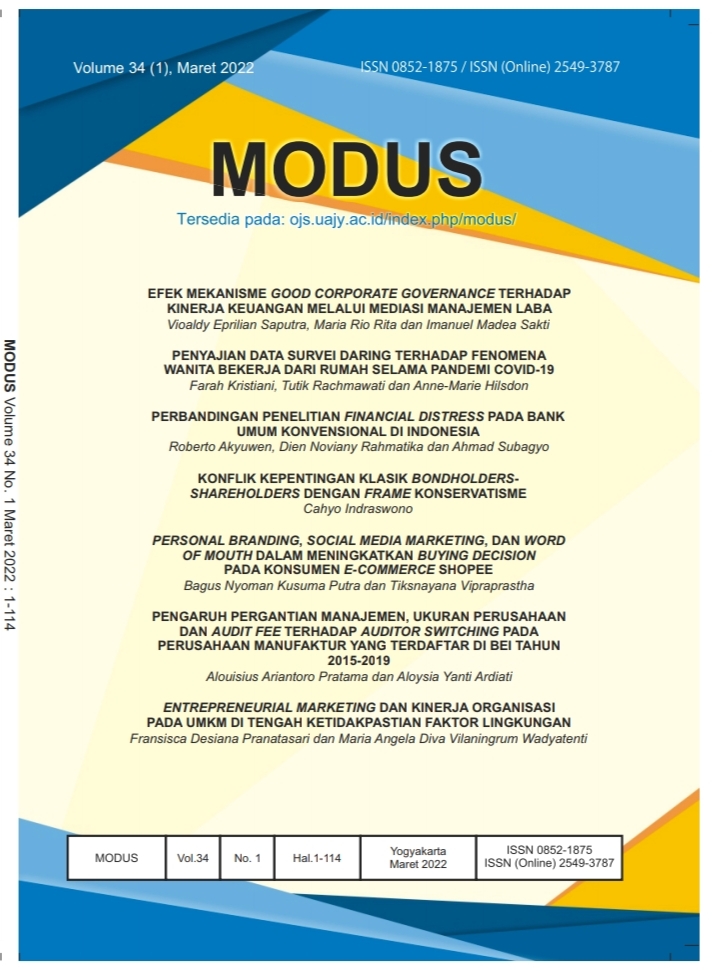ENTREPRENEURIAL MARKETING DAN KINERJA ORGANISASI PADA UMKM DI TENGAH KETIDAKPASTIAN FAKTOR LINGKUNGAN
DOI:
https://doi.org/10.24002/modus.v34i1.5175Abstract
ABSTRACT
Micro, small & medium enterprises (MSMEs) are the main actors that have become one of the pillars of the national economy in developing countries, especially Indonesia. The contribution of MSMEs to the national economy (GDP) is 61.1% and it is able to absorb productive workers in Indonesia. However, the Covid-19 pandemic has had a significant impact on MSME players, which resulted in a decline in Indonesia's GDP and indicated a global economic recession. In this uncertain condition, MSMEs are required to survive with all the resources that they have to maintain their performance and even expected to achieve growth. Entrepreneurial marketing (EM) is a right conceptual approach to implemented in MSMEs in order to maintain MSME performance in uncertain conditions, especially on external environmental factors. The concept of Entrepreneurial Marketing had replaced the traditional marketing concept which had been a business solution. This study provides a conceptual framework and analysis that discusses the role of entrepreneurial marketing that improves organizational performance in the middle of this uncertainty environmental factors in MSMEs from a literature review. Previous research has shown that entrepreneurial marketing has a positive impact on organizational performance in the middle of uncertain environment. Thus, it is hoped that the conceptual model of entrepreneurial marketing can improve the performance of SMEs in the middle of uncertain environment so as to achieve competitive advantage.
Keywords: entrepreneurial marketing (EM); organizational performance; uncertainty; environmental factors; micro, small & medium enterprises (MSMEs)
ABSTRAK
Usaha mikro, kecil & menengah (UMKM) merupakan aktor utama yang menjadi salah satu tonggak perekonomian nasional di negara berkembang khususnya Indonesia. Kontribusi UMKM terhadap perekonomian nasional (PDB) sebesar 61,1% dan mampu menyerap tenaga kerja produktif di Indonesia. Namun, pandemi Covid-19 memberikan dampak yang signifikan bagi pelaku UMKM yang berdampak pada turunnya PDB Indonesia dan mengindikasikan adanya resesi perekonomian global. Dalam kondisi ketidakpastian ini, UMKM dituntut untuk mampu bertahan dengan segala sumber daya yang dimilikinya untuk mempertahankan kinerja mereka bahkan diharapkan mampu mencapai pertumbuhan. Entrepreneurial marketing (EM) merupakan pendekatan konsep yang sesuai untuk diimplementasikan pada UMKM dalam rangka mempertahankan kinerja UMKM dalam kondisi ketidakpastian terutama pada faktor lingkungan eksternal. Konsep entrepreneurial marketing telah meninggalkan konsep pemasaran tradisional yang selama ini menjadi solusi usaha. Penelitian ini memberikan kerangka konseptual dan analisis yang membahas bagaimana peran entrepreneurial marketing terhadap peningkatan kinerja organisasi di tengah ketidakpastian faktor lingkungan pada UMKM melalui literature review. Penelitian terdahulu menunjukkan entrepreneurial marketing mampu memberikan dampak positif pada kinerja organisasi di tengah ketidakpastian lingkungan. Diharapkan model konseptual entrepreneurial marketing pada UMKM dapat meningkatkan kinerja UMKM di tengah ketidakpastian lingkungan sehingga mencapai keunggulan kompetitif.
Kata kunci: entrepreneurial marketing (EM); kinerja organisasi; ketidakpastian; faktor lingkungan; usaha mikro, kecil & menengah (UMKM)
References
Abdel-Maksoud, A., Dugdale, D. and Luther, R. (2005), Non-financial performance measurement in manufacturing companies, The British Accounting Review, 37(3), 261-297.
Alqahtani, N., & Uslay, C. (2020). Entrepreneurial marketing and firm performance: Synthesis and conceptual development. Journal of Business Research, 113(December), 62–71. https://doi.org/10.1016/j.jbusres.2018.12.035
Aragon-Correa, J.A. and Sharma, S. (2003), A contingent resource-based view of proactive corporate environmental strategy, The Academy of Management Review, 28(1), 71-88.
Arenas, A., Tabernero, C., & Briones, E. (2006). Effects of goal orientation, error orientation and self-efficacy on performance in an uncertain situation. Social Behavior and Personality, 34(5), 569–586. https://doi.org/10.2224/sbp.2006.34.5.569
Bäckbrö, J. & Nyström, H. (2006). Entrepreneurial marketing: Innovative value creation Master’s thesis. Jönköping International Business School, Jönköping University.
Bank Indonesia. (2015). Profil Bisnis Usaha Mikro, Kecil, dan Menengah (UMKM). Bank Indonesia dan LPPI.
Barney, J. (1991), Firm resources and sustained competitive advantage, Journal of Management, 17(1), 99-120.
Barney, J.B. (1986), Strategic factor markets: expectations, luck, and business strategy, Management Science, 32(10), 1231-1241.
Becherer, R. C., Haynes, P. J., & Fletcher, L. P. (2006). Paths to profitability in owner operated firms: the role of entrepreneurial marketing. Journal of Business and Entrepreneurship, 18(1), 17-45.
Becherer, R. C., Helms, M. M., & McDonald, J. P. (2012). The effect of entrepreneurial marketing on outcome goals in SMEs. New England Journal of Entrepreneurship, 15(1), 7–18. https://doi.org/10.1108/neje-15-01-2012-b001
Carson, D. & Grant, K. (1998). SME marketing competencies: A dentition and some empirical evidence. In Research at the Marketing/Entrepreneurship Interface, University of Illinois at Chicago, Chicago, IL. 173-186.
Cumby, J. and Conrod, J. (2001), Non-financial performance measures in the Canadian biotechnology industry, Journal of Intellectual Capital, 2(3), 261-272.
DJKN. (2020). UMKM Bangkit, Ekonomi Indonesia Terungkit. https://www.djkn.kemenkeu.go.id/artikel/baca/13317/UMKM-Bangkit-Ekonomi-Indonesia-Terungkit.html Diakses Januari 2021.
Fard, M. H., & Amiri, N. S. (2018). The effect of entrepreneurial marketing on halal food SMEs performance. Journal of Islamic Marketing, 9(3), 598–620. https://doi.org/10.1108/JIMA-12-2016-0097
Fillis, I. and Rentschler, R. (2006), Creative Marketing: An Extended Metaphor for Marketing in a New Age, Palgrave Macmillan, Basingstoke.
Fullerton, R.R. and Wempe, W.F. (2009), Lean manufacturing, non-financial performance measures, and financial performance, International Journal of Operations & Production Management, 29(3), 214-240.
Ghozali, I. (2011). Aplikasi Analisis Multivariate Dengan Program SPSS 19. (P. P.Harto, Ed.) (V). Semarang: Badan Penerbi Univ Diponogoro.
Gourinchas, P.-O., Kalemli-Özcan, Ṣebnem, Penciakova, V., & Sander, N. (2020). Covid-19 and SME Failures. National Bureau of Economic Research, 27877(1), 1–9. https://doi.org/https://www.nber.org/papers/w27877
Gunday, G., Ulusoy, G., Kilic, K. and Alpkan, L. (2008), Modeling innovation: determinants of innovativeness and the impact of innovation on firm performance, 4th IEEE International Conference on Management of Innovation and Technology, IEEE, Taipei, pp. 766-771.
Gunday, G., Ulusoy, G., Kilic, K. and Alpkan, L. (2011), Effects of innovation types on firm performance, International Journal of Production Economics, 133(2), 662-676.
Hagen, B., & Zucchella, A. (2018). Chapter 2: Entrepreneurial Marketing as a Key Driver of Early and Sustained Internationalisation. 25–40. https://doi.org/10.1108/s1876-066x20180000034002
Hoque, Z. (2005), Linking environmental uncertainty to non-financial performance measures and performance: a research note, The British Accounting Review, 37(4), 471-481.
Hult, G.T.M. and Ketchen, D.J. (2001), Does market orientation matter? A test of the relationship between positional advantage and performance, Strategic Management Journal, 22(9), 899-906.
Javidan, M. (1998), Core competence: what does it mean in practice?, Long Range Planning, 31(1), 60-71.
Kraus, S., Harms, R., & Fink, M. (2010). Entrepreneurial marketing: moving beyond marketing in new ventures, International Journal of Entrepreneurship and Innovation Management, 11(1), 19-34.
Maritz, A., Frederick, H., & Valos, M. (2010). A discursive approach to entrepreneurial marketing: Integrating academic and practice theory. Small Enterprise Research, 17(1), 74-86.
Morris, M., Schindehutte, M. and La Forge, R.W. (2002), Entrepreneurial marketing: a construct for integrating emerging entrepreneurship and marketing perspectives, Journal of Marketing Theory and Practice, 10(4), 1-19.
Morris, M. H., Kocak, A., & Ozer, A. (2007). Coopetition as a small business strategy: Implications for performance. Journal of Small Business Strategy, 18(1), 35-55.
Neely, A. (2002), Business Performance Measurement: Theory and Practice, Cambridge University Press, Cambridge.
Sabil, A. H. (2019). Metode Kuantitatif untuk Penelitian Manajemen (Disampaikan pada Workshop Analisis Kuantitatif; Konsep Dasar dan Implementasi dalam Riset). Denpasar.
Sarma, M., Septiani, S., Dewi, F. R., & Siregar, E. H. (2013). The Impact of Entrepreneurial Marketing and Business Development on Business Sustainability: Small and Household Footwear Industries in Indonesia. International Journal of Marketing Studies, 5(4), 110–122. https://doi.org/10.5539/ijms.v5n4p110
Škrinjar, R., Bosilj-Vukšic, V. and Indihar-Štemberger, M. (2008), The impact of business process orientation on financial and non-financial performance, Business Process Management Journal, 14 (5), 738-754.
Soeprajitno, Hendra. 2016. Entrepreneurial Marketing Recipe. Majalah Marketeers Edisi September 2016.
Tambunan, H. T. (2011). Development of small and medium enterprises in a developing country. Journal of Enterprising Communities: People and Places in the Global Economy, 5(1), 68-82.
Toghraee, M. T., Rezvani, M., Mobaraki, M. H., & Farsi, J. Y. (2017). A Systematic Review on Entrepreneurial Marketing: Three Decade Research on Entrepreneurial Marketing. International Journal of Applied Business and Economic Research, 15(8), 273–296.















